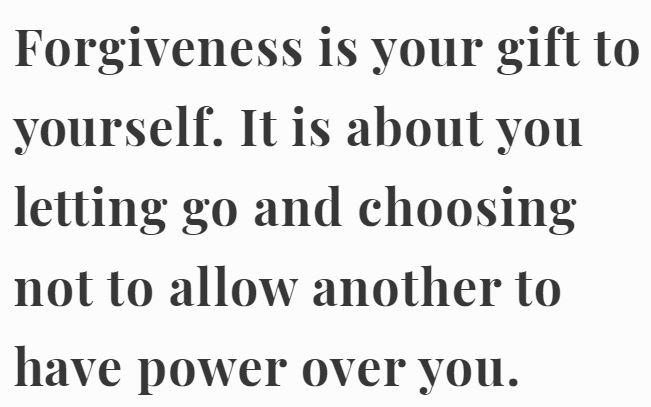If you have been following my posts, then you would probably have read my article on forgiveness. Forgiving others helps you free yourself from the resentment, the bondage, the pain, and the negative emotions of revenge allowing you to finally focus on what matters most – you, your life, and your goals! Forgiveness is the process of letting go of all the pain and negativity!
However, it is easy to ask someone to forgive without giving them some idea of how to do so. How is someone supposed to forgive a mother who has ignored you all through childhood or a parent who has made you feel like you are not important? How are you supposed to forgive a sibling or close friend who has betrayed your trust? How are you supposed to forgive a spouse who was never there for you but was found emotionally and physically cheating on you?
Each of these situations is different. But the path down the forgiveness road is interestingly similar because the one person you have to work on is yourself!
While each one of us may go through these steps for forgiveness in our own way, here are some things that you can do to help the process along.

Willingness to forgive
Despite the many reasons why it is important to forgive, the process cannot start unless you are really willing to forgive the other person. You may understand the cognitive reasons for doing so and you may know that it is only helping you in the process of moving on. But you have to be really willing to aloe this process to happen and put in the work required in your mind to actually let go.
Forgiving someone is not merely saying to another person that you have forgiven them. It is how you feel inside that matters and you will know when you are ready to take this step for your own growth. As yourself how long you want to hold on to the pain? How much time will you lose in trying to plot revenge? How much negativity you are willing to attract towards yourself by exuding so much of it? When you forgive someone (even they are not asking for forgiveness), you take responsibility for what you can control – and that is extremely empowering and a great motivator for you to move on with your life!
Do no Harm
Forgiveness does not happen as soon as you feel that you want to forgive. How are you supposed to do that anyway? The first step that is concrete is to decide to ‘Do No Harm”. What this means is that you consciously stop saying anything negative about the person who has hurt you in the past to others and to yourself too. You do not have to say great things about them but you do have to stop yourself from making any disparaging statements.
If you find yourself operating from a place of pride or feel that forgiving makes you feel weak, try some everyday acts of compassion to make you feel connected to humanity in general. This starts to move you towards becoming a more compassionate person and sets the stage for further steps towards forgiveness.
Look Inside and Feel Your Pain
Anger is a very common go-to emotion when someone hurts you, betrays you, or does not fulfill your most basic expectation. In the aftermath of a hurtful event, it is common for us to suppress feelings of sadness, self-loathing, or low confidence. Lashing out on the guilty party is so much easier and shifts the attention.
If you have not allowed yourself to grieve over what you lost when you were hurt, you need to review that aspect now. Sometimes it is the loss of a relationship and other times it is the loss of your ego or pride. Some serious thinking needs to be done in the area of – why you felt hurt with the actions of another? Dealing with your inner pain and going to some really dark places within can get you ready for the process of letting go! It is almost as if you have to be done with all the crying and the pain to be able to take the next step!
Develop your Empathy
One of the main aspects of forgiving someone requires understanding what was going on in their mind when they did what they did. Not an easy task! Also, many times the person who hurt you may not be willing to share his/her own reasons for the act. What is one supposed to do then?
An exercise that you can do is to create a reality for the individual that could have led them to behave in a manner that they did. Imagine them as a child and what their childhood would have been like. Think of the struggles that they may have gone through and what they may have conquered along the way. Create a whole story in your head about this person. You may realize that there are various aspects about this person that you have no way of knowing and therefore be willing to give them the benefit of doubt for their actions. This is not to say that you are rationalizing their behavior and what they did but you are able to understand their perspective better!
See it Positively
No, I am not kidding! Every event in our lives happens for a reason and each one of us has our own journey to traverse. The maximum amounts of learning, self-development, self-awareness, and growth emanate and get initiated from painful events in life. There are very few people who start to look at a life of self-discovery and meaning without going through a significant painful period in their lives.
Look at the incident that led you to feeling hurt. Examine it and understand how it has benefitted you now. Think about how you are different because of it and what areas in your life it has amplified. Finding meaning in the incident can help pave the path towards forgiveness.
Make it Permanent
Since you have gone through a long and difficult process to forgive someone, you can be cognizant of the process and make this a permanent thing. You can not just forgive this once but allow yourself to be a forgiving person. When you practice the process for some time, the empathy and understanding required to forgive can become a part of you; in such a way that you are able to hold no grudge at all!
Now That’s What I Call Self-Development!


Agree completely. Act of forgiveness is one sided – because it is about you and not the source of ‘hurt’. However sometimes I wonder if the hurt is generated repeatedly, how long will the forgiveness be permanent.
Love your comment. Forgiveness does not mean condoning the act that was done. It also does not mean that one does not learn from the situatuon or does nit guard oneself from that hurt in the future. It is besy to take the lesson, forgive the person, forgive yourself for allowing that hurt (or being naive to fall prey) and take adequate steps towards not getting hurt again…. Without resentment!